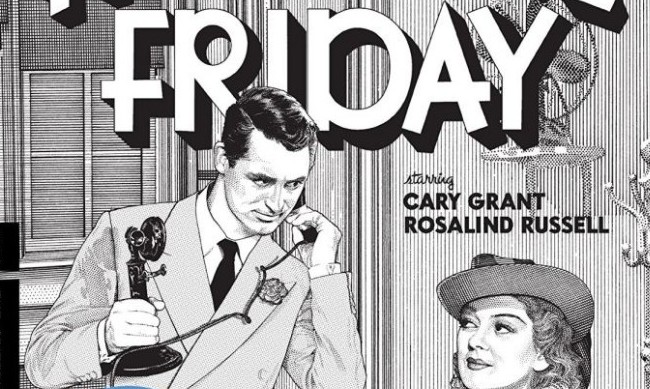
His Girl Friday (1940) Blu-Ray Review

Howard Hawks was pretty much a master at whatever genre of film he turned to: war films (Sergeant York, 1942), gangsters (Scarface, 1932), the western (Red River, 1948 and Rio Bravo, 1959), thriller (The Big Sleep, 1946) or musical (Gentlemen Prefer Blondes, 1953). But it was the screwball comedy that he excelled at. He practically invented screwball with the likes of Twentieth Century (1933) before going on to make Bringing Up Baby (1938) and the film presented on this wonderful presentation by the Criterion Collection, His Girl Friday (1940). Hawks was a man’s man who believed making films should be about making money and having fun. But there is a professionalism and intelligence with the film as well as a deep sense of fun and black humour. This intelligence and style or the themes in his film were recognised by the cinema intelligentsia in France in the 1950s and 60s and labelled him as one of the auteurs, along with the likes of John Ford and Alfred Hitchcock, further increasing Hawks’ reputation.
This new double disc release by Criterion Collection is packaged to further emphasize this with lashings of featurettes and framing documentaries, the best of which is film historian David Bordwell’s analysis of the film in which he highlights many elements and details within the film that are only seen by a keen observer. What is evident is how sharp both Charles Lederer’s script and Hawks’ direction is. This is clear when seen next to the original film, The Front Page made in 1931. Directed by Lewis Milestone, The Front Page is included on the 2nd disc and next to His Girl Friday looks a rather leaden comedy. This is not to say Milestone’s film is bad, but instead highlights how good Hawks’ film is. Both films are based off great Hollywood writers Ben Hecht and Charles MacArthur’s play ‘The Front Page’. Both had been hack journalists in Chicago in the height of the gangsterdom of the Roaring Twenties and brought many of their own stories into the play that was to become a Broadway hit in 1928. On looking at the play and the film again, Hawks saw effectively a love story and with Lederer went about ‘improving’ the play/film by changing the Hildy Johnson character from being a man into a woman, recognising here a love story (in Milestone’s film there is little chemistry between the two leads played by Ad0lphe Menjou and Pat O’Brien). And the sharpness of Hecht and MacArthur’s dialogue became the tight dialogue of Lederer and Hawks’ artistry as a director made sharper by the editing.
There is a perfect chemistry between star Cary Grant and here his female sparring partner, Rosalind Russell. Russell gives as good as she gets in this film and both seem to be having the kind of fun that Hawks himself said he was pursuing. The opening scene gives us a flavour of what we’re in for. Hildy Johnson (Russell) marches through the busy offices of the newspaper she used to work for and into the office of the paper’s dynamic and manipulative editor, Walter Burns (Grant). Burns and Johnson used to be married and are now divorced. Hildy is with her fiancee Bruce (George Bellamy), the man she is about to marry and settle down with in Albany, upstate New York. George is nice, dull and stable, everything Burns isn’t. In this long opening scene we see the film as it’s best with the snappy repartee of the interchanges between the former married couple. Hildy knows what Walter is like whereby he constantly tries to ‘con’ her into remaining with the paper and covering one last hanging, knowing that being a newspaper man is her life.
Hawks’s interpretation of the play is pitch perfect and the many extras spread across both discs perfectly frame this. On the 2nd disc there is the original 1931 The Front Page including a documentary about its restoration and another on writer Ben Hecht. There are also many other featurettes that cover the dialogue in the film as well as the motifs and about Russell and Hawks themselves. There is also an hour long Lux radio version of the play starring Fred MacMurray and Claudette Colbert; fast talking MacMurray makes for a superb Walter Burns. Interestingly throughout there is no mention of Billy Wilder’s own remake of the 1931 film made in 1974 and starring Walter Matthau and Jack Lemmon. Never the less it is interesting to see how Hawks not only adapted a well received Broadway play but was also facetious enough to drastically change it around and improve on it. One thing that is abundantly clear is that Howard Hawks delivered a dialogue and a type of film many have tried to repeat but never succeeded.
Chris Hick
